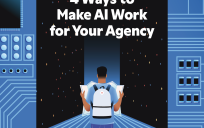Providing a secure and efficient customer experience (CX) can be a challenge. But when the C stands for “citizen” — as in the case management personnel and platforms that government agencies rely on to provide the “citizen” customer experience — the task is even more daunting. Despite enhanced challenges involving more sensitive data, stronger authentication and higher stakes for essential services, delivering on the citizen experience can be hampered by inflexible legacy applications, where processes are slow and manual tasks are unavoidable.
Fortunately, agencies are increasingly able to leverage AI process automation, state-of-the-art reporting and automated cloud-based security and compliance capabilities to meet these challenges.
The Citizen Experience Poses Case Management Challenges
The citizen experience poses unique demands on IT that go beyond the typical service requirements for most private-sector CX scenarios. While the overall objective may be the same — support a transaction or resolve an issue with the least amount of friction — the environment for achieving these goals on behalf of citizens is more complicated. To begin with, case managers face stronger accessibility demands around the citizen experience compared to their private-sector CX counterparts.
By law, the citizen experience must be inclusive, taking into account reading level, Americans with Disabilities Act requirements and other accessibility factors that tend to go beyond what’s required of private companies. In addition, the citizen experience typically features more sensitive and plentiful amounts of data. Many government services and transactions require more documentation to verify grant eligibility, establish lawful presence or file a dispute; and the security and regulatory concerns around such data can complicate or extend the case management lifecycle.
To combat identity theft, for example, some state motor vehicle departments now issue a temporary photo ID (in person) while a facial recognition background check is conducted (via third-party vendors) before a permanent license is granted (in the mail). These additional steps and engagement channels add complexity for agency personnel and the case management platforms they rely on to do their jobs. All the while, the cost of failure is higher than in most private-sector CX scenarios; there’s a big difference, after all, between a lost yoga mat from an e-commerce site and a lost benefits check from a public health program.
AI-Driven Transformation for Citizen Case Management
The above challenges persist at all levels of government, including state and local agencies, and they demand innovative case management solutions. Whether it’s a straightforward matter of managing everyday city services, or a complex and long-term scenario such as care coordination for a chronic health condition, the modernization goal should be better visibility and control across the entire case management ecosystem.
This is most often achieved with the help of AI. To use a fairly simple example, AI can be deployed to manage citizen reports on a recorded line for dangerous road conditions. This may involve natural language processing to reconcile different terminology (i.e. pothole, ditch, chuckhole) that citizens may use; proactive prompts for trending issues (“are you calling about road conditions at 5th and Main Streets?”); and decision support algorithms to prioritize fixes.
AI can be a game changer for other case management scenarios that are far more complex, such as managing a chronic mental health condition or providing permanent disability benefits — situations where a state or county is the care coordinator and cases can go on for years. Case managers here can use generative AI to scan a decade’s worth of case notes for diagnostic trends, eligibility changes, program compliance and other dynamics.
Architecting the Right CM Platform
While each agency will have its own unique set of requirements for leveraging AI and related innovations to modernize their case management technologies, transformation teams can focus on some key architectural priorities to ensure success. Chief among these is to ensure that the underlying data environment is as flexible and granular as possible. This will help support AI investments in particular, which rely on broader and faster access to data.
The starting point should be a solid data management strategy that aligns all metadata, definitions and data attributes consistently across the IT estate. Supporting this strategy should be an underlying data architecture that connects all data sources and eliminates silos — preferably through a virtualization layer that accesses data where it resides, regardless of where that location may be across an agency and its third-party networks.
A case management platform founded on this modern data architecture also brings strong traceability, ensuring every step of a case management process is decomposed and represented at the granular data level. The key is to pair this level of insight with intuitive, dashboard-driven platforms that a typical agency professional can use without the need to understand computer code. That way, case managers can focus on adjusting processes and workflows, while the system automatically configures and aligns the underlying data to reflect these changes.
Conclusion
Compared to most private-sector CX environments, the citizen experience presents special challenges to government case managers tasked with providing essential services at a frictionless level of efficiency that citizens have come to expect. The good news is that modern case management platforms can help agencies rise to these challenges through more visibility, control and traceability of all the data and processes that make up the case management journey.
Jason is the Industry Vice President for Global Public Sector at Appian. Previously he was the Director of the Business Solutions and Services Team at Serco.
In his more than 20 years of government IT experience, Adolf has delivered complex technical solutions to federal clients including the Centers for Medicare and Medicaid Services, the General Services Administration, the Department of Veterans Affairs, the Food and Drug Administration and numerous Defense Department.





Leave a Reply
You must be logged in to post a comment.